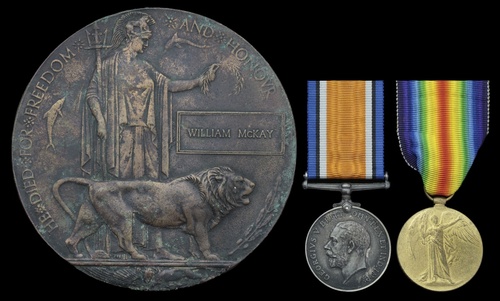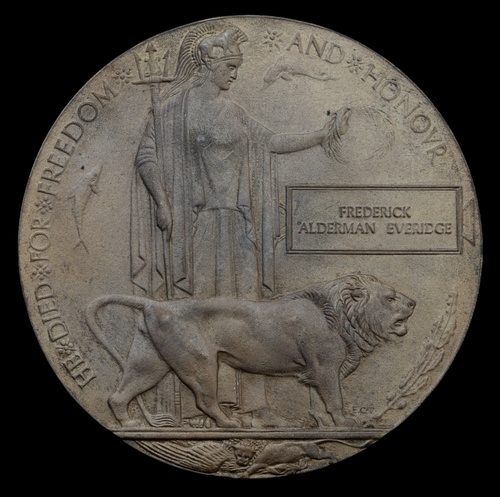'...the earth heaved and flashed, a tremendous and magnificent column rose up into the sky. There was an ear-splitting roar, drowning all the guns, flinging the machine sideways in the repercussing air. The earthy column rose, higher and higher to almost four thousand feet. There it hung, or seemed to hang, for a moment in the air, like the silhouette of some great cypress tree, then fell away in a widening cone of dust and debris. A moment later came the second mine. Again the roar, the upflung machine, the strange gaunt silhouette invading the sky. Then the dust cleared and we saw the two white eyes of the craters.' A Pilot of the Royal Flying Corps recalls being over the Lochnagar Mine on 1 July 1916, when it was blown by Lieutenant McKay. An impressive Great War 'Tunnellers' M.C. group of five awarded to Lieutenant A. M. McKay, 179 Tunnelling Company, Royal Engineers, late Private, Royal Scots - McKay latterly died of wounds on 18 May 1918, before he could learn of his richly-deserved M.C. Military Cross, G.V.R., unnamed as issued, in its case of issue; 1914-15 Star (2321 Pte. A. M. McKay. R. Scots.); British War and Victory Medals (Lieut. A. M. McKay.); Great War Bronze Memorial Plaque (Alexander Matheson McKay), in its card envelope, good very fine (5) M.C. London Gazette 3 June 1918. An original typed - if torn - citation states: 'For consistent good work and devotion to duty during October and November 1917. His men were employed cleaning out German Pillboxes in Poelcappelle, North of Ypres; it was mainly due to his energy and coolness under severe and almost continuous gas and high-explosive shell fire that the work was satisfactorily accomplished. He was present at the Battles of the Somme, Arras, Messines and the last Battle of Ypres and has at all times displayed great coolness and courage and set a splendid example to his men.' Alexander Matheson McKay enlisted on 12 September 1914 into the Royal Scots and served in France with the 1/9th Battalion from 24 February 1915. Applying for a commission in September 1915, he was attached to the Brigade Mining Section from 24 September 1915 and joined the 184th Tunnelling Company, Royal Engineers from 7 December 1915. Commissioned 2nd Lieutenant on 20 February 1916, he joined the 179th Tunnelling Company the following day. It was with the 179th Company that McKay carved his name into the history of the Great War, one can only imagine the conditions they worked in but historian Simon Jones gives detail to his part in the blowing of the Lochnagar Mine: 'Both charges at Lochnagar required twelve detonators, connected in series, each inserted into a guncotton primer, which were placed inside charge bags and buried evenly throughout the explosives, plus a complete back-up system of another twelve detonators in case the first failed. It was the most dangerous part of the work, carried out by the officers in the chambers, surrounded by hundreds of stacked bags of explosives... Bullock and McKay had all the detonators in, the leads connected and the two chambers about three-quarters charged when Young came up that afternoon to take over. He expected to check that the detonators were in correctly and the leads properly connected, but Bullock and McKay had worked much faster than he anticipated - one senses rivalry between the shifts and the officers - and Young had no choice but to report to Hance that everything was in order. By the following morning they had completed the charging and begun backfilling, or tamping, the tunnel. They had stored hundreds of sandbags of chalk along the gallery in readiness and used them to block the tunnel solidly for 350 feet from the branch... At 7.28 a.m. Stanley Bullock rammed down the handle of his exploder to fire the first of the Inch Street mines. After the merest pause, he felt the ground beneath him shudder, a few seconds later another shake of the ground told him that Young had successfully fired Lochnagar: In the suspense which ensued bef
'...the earth heaved and flashed, a tremendous and magnificent column rose up into the sky. There was an ear-splitting roar, drowning all the guns, flinging the machine sideways in the repercussing air. The earthy column rose, higher and higher to almost four thousand feet. There it hung, or seemed to hang, for a moment in the air, like the silhouette of some great cypress tree, then fell away in a widening cone of dust and debris. A moment later came the second mine. Again the roar, the upflung machine, the strange gaunt silhouette invading the sky. Then the dust cleared and we saw the two white eyes of the craters.' A Pilot of the Royal Flying Corps recalls being over the Lochnagar Mine on 1 July 1916, when it was blown by Lieutenant McKay. An impressive Great War 'Tunnellers' M.C. group of five awarded to Lieutenant A. M. McKay, 179 Tunnelling Company, Royal Engineers, late Private, Royal Scots - McKay latterly died of wounds on 18 May 1918, before he could learn of his richly-deserved M.C. Military Cross, G.V.R., unnamed as issued, in its case of issue; 1914-15 Star (2321 Pte. A. M. McKay. R. Scots.); British War and Victory Medals (Lieut. A. M. McKay.); Great War Bronze Memorial Plaque (Alexander Matheson McKay), in its card envelope, good very fine (5) M.C. London Gazette 3 June 1918. An original typed - if torn - citation states: 'For consistent good work and devotion to duty during October and November 1917. His men were employed cleaning out German Pillboxes in Poelcappelle, North of Ypres; it was mainly due to his energy and coolness under severe and almost continuous gas and high-explosive shell fire that the work was satisfactorily accomplished. He was present at the Battles of the Somme, Arras, Messines and the last Battle of Ypres and has at all times displayed great coolness and courage and set a splendid example to his men.' Alexander Matheson McKay enlisted on 12 September 1914 into the Royal Scots and served in France with the 1/9th Battalion from 24 February 1915. Applying for a commission in September 1915, he was attached to the Brigade Mining Section from 24 September 1915 and joined the 184th Tunnelling Company, Royal Engineers from 7 December 1915. Commissioned 2nd Lieutenant on 20 February 1916, he joined the 179th Tunnelling Company the following day. It was with the 179th Company that McKay carved his name into the history of the Great War, one can only imagine the conditions they worked in but historian Simon Jones gives detail to his part in the blowing of the Lochnagar Mine: 'Both charges at Lochnagar required twelve detonators, connected in series, each inserted into a guncotton primer, which were placed inside charge bags and buried evenly throughout the explosives, plus a complete back-up system of another twelve detonators in case the first failed. It was the most dangerous part of the work, carried out by the officers in the chambers, surrounded by hundreds of stacked bags of explosives... Bullock and McKay had all the detonators in, the leads connected and the two chambers about three-quarters charged when Young came up that afternoon to take over. He expected to check that the detonators were in correctly and the leads properly connected, but Bullock and McKay had worked much faster than he anticipated - one senses rivalry between the shifts and the officers - and Young had no choice but to report to Hance that everything was in order. By the following morning they had completed the charging and begun backfilling, or tamping, the tunnel. They had stored hundreds of sandbags of chalk along the gallery in readiness and used them to block the tunnel solidly for 350 feet from the branch... At 7.28 a.m. Stanley Bullock rammed down the handle of his exploder to fire the first of the Inch Street mines. After the merest pause, he felt the ground beneath him shudder, a few seconds later another shake of the ground told him that Young had successfully fired Lochnagar: In the suspense which ensued bef















Testen Sie LotSearch und seine Premium-Features 7 Tage - ohne Kosten!
Lassen Sie sich automatisch über neue Objekte in kommenden Auktionen benachrichtigen.
Suchauftrag anlegen